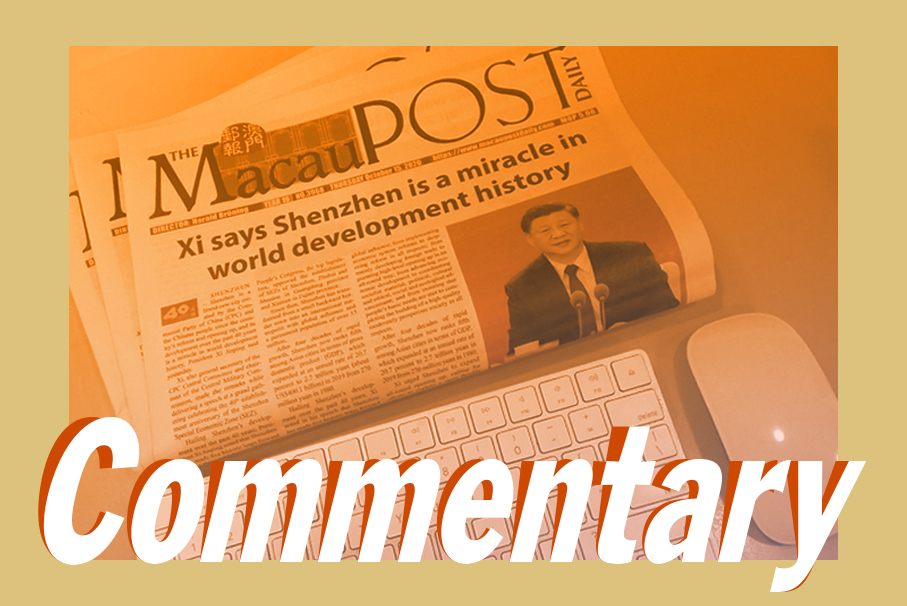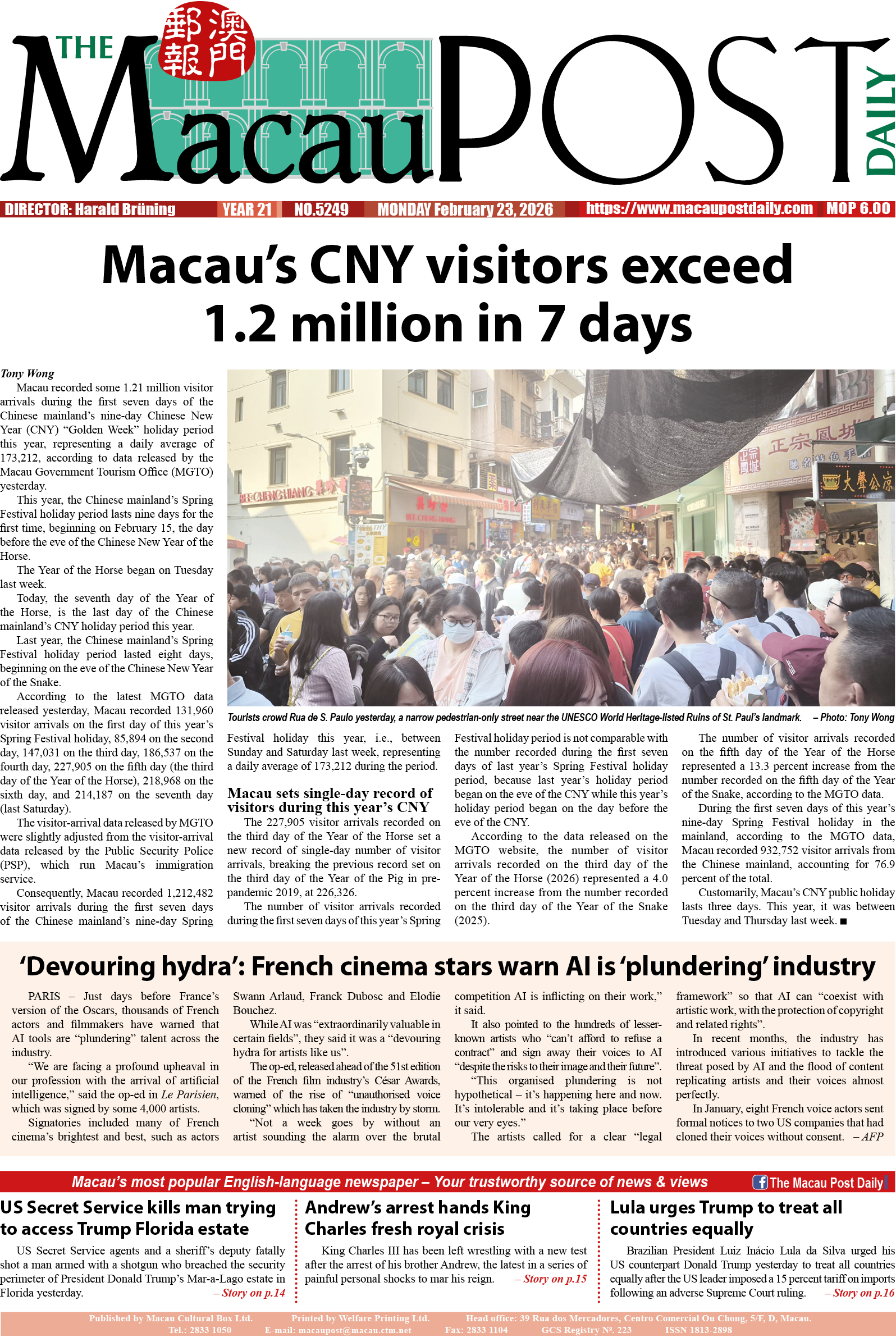Addressing yesterday’s weekly press conference about Macau’s novel coronavirus situation, Alvis Lo Iek Long, a clinical director of the public Conde de São Januário Hospital Centre, announced that the government will lower the current testing fee of 100 patacas to 90 patacas for its nucleic acid testing (NAT) scheme from next Monday.
A new NAT station located at the Workers Stadium next to the Barrier Gate border checkpoint came into service yesterday. The new testing station, the city’s fifth one, is jointly run by the local Macau Federation of Trade Unions (Gung Luen) – which owns the stadium, Guangdong Nam Yue Group Corporation Limited – which is owned by the Guangdong provincial government, and Guangzhou KingMed Diagnostics Group Company Limited.
The other four testing stations run under the Macau government’s NAT scheme, which came into operation at different times last year, are located at the Taipa Ferry Terminal in Pac On, the Macau Forum complex in Zape, the private Kiang Wu Hospital, and the University Hospital run by the private Macau University of Science and Technology (MUST).
The Health Bureau (SSM) has commissioned a third-party testing institution – Kuok Kim (Macau) Hygiene Examination Company Limited – to carry out COVID-19 testing under its NAT scheme, which was launched in May last year, at two testing stations – the main one at the Pac On ferry terminal and the other one at the Macau Forum complex. Kiang Wu Hospital, which is located on the peninsula, and the University Hospital, which is located on the MUST campus in Taipa, joined the government’s NAT scheme in August and September last year respectively.
Like at the Macau Forum complex, Kiang Wu Hospital and University Hospital NAT stations, those undergoing their nucleic acid tests at the new Workers Stadium station will have their sample collected via a nasopharyngeal swab. Sample collection via an oropharyngeal swab is only available at the Pac On ferry terminal station.
The testing fee was 180 patacas when the NAT programme was launched in May last year, before it was lowered to 120 patacas in August. The NAT fee was further lowered to 100 patacas in November last year.
In Hong Kong, a nucleic acid test costs HK$240 at the government’s NAT facilities, officially known as Community Testing Centres.
The NAT fee in Zhuhai was lowered to 50 yuan yesterday from 75 yuan. Its testing fee was lowered to 75 yuan in May last year from the initial 160 yuan.
Health Bureau Director Lei Chin Ion told reporters on Saturday that while Macau’s NAT fee is higher than Zhuhai’s, it is cheaper than many other cities in the mainland.
Govt raises NAT quota to 27,000 per day
Meanwhile, Lo also announced during yesterday’s press conference that the government has raised the quota for its NAT scheme’s online appointment system to 27,000 people per day, comprising 12,000 at the Taipa Ferry Terminal station, 8,000 at the Macau Forum complex station, 3,000 at the Kiang Wu Hospital station, 3,000 at the University Hospital station, and 1,000 at the new Workers Stadium station.
The NAT scheme’s appointment quota for COVID-19 testing was raised to 19,000 people per day in September last year, comprising 13,000 at the Pac On station and the Macau Forum station combined, 3,000 at the Kiang Wu Hospital station, and 3,000 at the University Hospital station.
Lo also said that in addition to the quota of 27,000 people per day at the city’s five NAT stations, the Health Bureau has a COVID-19 testing capability of 10,000 people per day in response to the possibility of Macau confirming new local COVID-19 cases, apart from the five stations’ respective ability to readily raise their COVID-19 testing capacity in a short time.
Macau has not recorded a new COVID-19 case for 23 days, while no local case has been confirmed in 337 days.
Macau has recorded 48 COVID-19 cases since January 22 last year, 46 of which have been classified as imported, while two cases have been classified as “connected to imported cases”. Among the 48 patients, 47 have been cured and discharged from hospital, and no fatalities have been reported in Macau.
Collective vaccinations for entities
Meanwhile, the Health Bureau’s Control of Communicable Diseases and Surveillance of Diseases Department Coordinator Leong Iek Hou announced during yesterday’s press conference that her bureau is asking public entities, schools, social service organisations and community associations to arrange for their respective staff members to get the government’s COVID-19 jabs collectively.
Different from the Health Bureau’s (SSM) previous collective vaccination programmes for staff of the city’s various organisations when SSM medical workers went to their respective workplaces to provide on-site vaccination services, the COVID-19 collective vaccination service for the various entities will be carried out at the Health Bureau’s vaccination facilities – i.e. no on-site services will be provided, according to Leong.
Leong said that many of the public entities, schools, social service organisations and community associations have told her bureau that they will soon organise their staff members to undergo the collective vaccinations at the government’s vaccination facilities, which comprise two inoculation facilities at the public Conde de São Januário Hospital Centre, eight public health centres and two public health stations.
Leong said that for the next step her bureau will contact the city’s gaming operators and various other entities for their respective COVID-19 staff collective vaccination drives.
Leong also reaffirmed that the Health Bureau will only decide when its COVID-19 vaccinations for non-resident workers, non-local students enrolled in Macau and all other non-locals who hold a permit to stay in Macau – i.e. its vaccination drive’s third phase – will start after assessing the operation of its COVID-19 vaccination drive, which is currently carried out for local residents only.
The government’s inoculation drive started on February 9 with China’s Sinopharm covering those in priority groups such as medical workers, firefighters, police and customs officers, air crew members, public transport drivers, staff of social service facilities, teaching staff and casino workers – i.e. the campaign’s first phase, before the second phase, which covers all local residents, commenced on Monday last week.
The COVID-19 jabs are free of charge. Each person requires two jabs. Participation in the vaccination drive is carried out on a voluntary basis.
Germany’s BioNTech vaccinations will start tomorrow.
Lo to head Health Bureau
Meanwhile, informed sources told The Macau Post Daily last night that Alvis Lo Iek Long, a clinical director of the public hospital, will replace Lei Chin Ion as director of the Health Bureau (SSM) early next month.
The sources pointed out that Lei, born in 1960, has been working as a doctor for the Health Bureau for 36 years. The sources praised Lei for his professionalism and his “very hard work” during the government’s ongoing anti-COVID-19 control and prevention measures. “We all should be grateful for his professional commitment to keeping Macau safe from the virus,” one of the sources said.

Alvis Lo Iek Long, one of the three clinical directors of the public Conde de São Januário Hospital Centre, addresses yesterday’s press conference about the city’s novel coronavirus (COVID-19) situation. Photo: GCS







